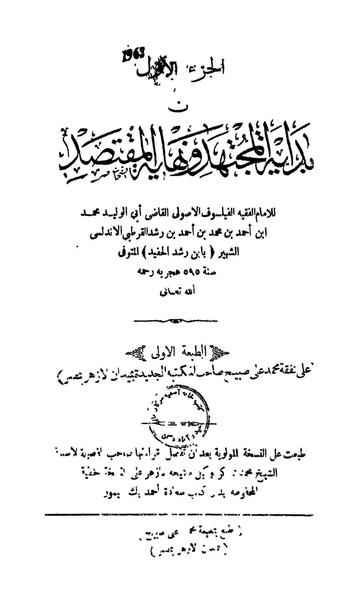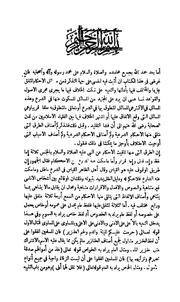File:The Beginning for the Studious and the End for the Selective WDL7436.pdf

Original file (2,237 × 3,750 pixels, file size: 63.75 MB, MIME type: application/pdf, 400 pages)
Captions
Captions
Summary[edit]
| Author |
Русский: Аверроэс, 1126-1198 гг.
Français : Averroès, 1126-1198
English: Averröes, 1126-1198
中文:阿威罗伊,1126-1198 年
Português: Averróis, 1126-1198
العربية: ابن رشد، 1126-1198
Español: Averroes, 1126-1198 |
| Title |
Русский: Начало для прилежного и конец для выбирающего
Français : Le début pour l'homme studieux et la fin pour l'homme partial
English: The Beginning for the Studious and the End for the Selective
中文:以审慎开始,以选择结束
Português: O início para o estudioso e o fim para o seletivo
العربية: بداية المجتهد ونهاية المقتصد
Español: El comienzo para los estudiosos y el fin para los selectivos |
| Description |
Русский: Мухаммад ибн Ахмад ибн Рушд (также известный по латинизированному варианту имени как Аверроэс, годы жизни 1126-1198 гг. н.э. или 520–595 гг. хиджры) – мусульманский ученый-энциклопедист и выдающийся философ Арабской Испании. Он родился в Кордове в хорошо обеспеченной семье, получившей признание за государственную службу. Ибн Рушд написал труды по различным областям знания, от астрономии до исламской юриспруденции и теории музыки, хотя на Западе он более известен как автор комментариев к философским сочинениям Аристотеля. Он выступал в защиту разума и философии от пренебрежительного отношения со стороны богословов, таких как Аль-Газали, доказывая, что религия и философия совместимы, и обе могут привести к истине. Он умер в Марракеше в Марокко. "Bidāyat al-Mujtahid wa Nihāyat al-Muqtaṣid" ("Начало для прилежного и конец для выбирающего") является, возможно, его важнейшей работой в области юриспруденции, особенно в рамках религиозной правовой школы Малика и философских принципов суннитского ислама, которые он проповедовал.
Исламское законодательство; Исламская философия; Юриспруденция; Сунниты Français : Muhammad ibn Ahmed ibn Rushd (également connu sous le nom latin d'Averroès, 1126–1198 apr. J.-C., 520–595 après l'Hégire) fut un polymathe musulman et le philosophe le plus éminent de l'Espagne arabe. Il naquit à Cordoue dans une famille respectée et connue pour son dévouement au service public. Bien que mieux connu en Occident pour ses commentaires sur la philosophie aristotélicienne, Ibn Rushd a également écrit des œuvres sur un large domaine de sujets, de l'astronomie à la théorie de la musique, en passant par la jurisprudence islamique. Il fut le défenseur de la raison et de la philosophie contre les érudits religieux dénigrants tels qu'Al-Ghazali. Il soutenait que la religion et la philosophie sont compatibles, et que les deux peuvent mener à la vérité. Il mourut à Marrakech, au Maroc. Bidāyat al-Mujtahid wa Nihāyat al-Muqtaṣid (Le début pour l'homme studieux et la fin pour l'homme partial) est peut-être son œuvre la plus importante dans le domaine de la jurisprudence, notamment dans l'école malikite de pensée et de droit religieux au sein de l'islam sunnite, à laquelle il appartenait.
Loi islamique; Philosophie islamique; Jurisprudence; Sunnites English: Muhammad ibn Ahmed ibn Rushd (also known by the Latinized version of his name, Averroes, 1126–98 AD; 520–95AH) was a Muslim polymath and the preeminent philosopher of Arab Spain. He was born in Cordoba to a well-respected family that was known for its public service. Although best known in the West for his commentaries on Aristotelian philosophy, Ibn Rushd wrote works on a wide range of subjects, from astronomy to Islamic jurisprudence to music theory. He defended reason and philosophy against disparaging religious scholars such as Al-Ghazali, arguing that religion and philosophy are reconcilable; that both can lead to the truth. He died in Marrakesh, Morocco. Bidāyat al-Mujtahid wa Nihāyat al-Muqtaṣid (The beginning for the studious and the end for the selective) is perhaps his major work in the field of jurisprudence, particularly in the Maliki school of religious law and thought within Sunni Islam to which he belonged.
Islamic law; Islamic philosophy; Jurisprudence; Sunnites 中文:穆罕默德·伊本·艾哈迈德·伊本·路世德(Muhammad ibn Ahmed ibn Rushd,拉丁名阿威罗伊 [Averroes],公元 1126–98 年,伊斯兰历 520–95 年)是穆斯林通才以及阿拉伯人统治西班牙时期的著名哲学家。他出生于科尔多瓦的名门,家族以公共服务而享有盛名。伊本·路世德在西方以研究亚里士多德的哲学著称,不过他的研究范围其实非常广泛,作品涵盖从天文学、伊斯兰法学到音乐理论的各种主题。他曾与汗扎里 (Al-Ghazali) 等贬低理性和哲学的宗教学者辩论,认为宗教和哲学可并存不悖,两者均可指引我们找到真理。他卒于摩洛哥的马拉喀什。Bidāyat al-Mujtahid wa Nihāyat al-Muqtaṣid(《以审慎开始,以选择结束》)是他在法学领域——尤其在其所属的伊斯兰教逊尼派宗教法规与思想中的马利基学派——的主要著作。
伊斯兰法律; 伊斯兰哲学; 法学; 逊尼派 Português: Muhammad ibn Ahmed ibn Rushd (também conhecido pela versão latinizada do seu nome, Averróis, 1126–1198 d.C.; 520–595 a.H.) foi um polímata muçulmano e um proeminente filósofo da Espanha árabe. Ele nasceu em Córdoba de uma família muito respeitada que era conhecida pelo seu serviço público. Embora mais conhecido no ocidente por seus comentários sobre a filosofia aristotélica, Ibn Rushd escreveu obras sobre uma grande variedade de assuntos, da astronomia à jurisprudência islâmica e à teoria da música. Ele defendeu a razão e a filosofia contra eruditos religiosos depreciativos, tais como Al-Ghazali, argumentando que a religião e a filosofia são conciliáveis e que ambas podem levar à verdade. Ele morreu em Marraqueche, Marrocos. Bidāyat al-Mujtahid wa Nihāyat al-Muqtaṣid (O início para o estudioso e o fim para o seletivo) talvez seja sua obra mais importante no campo da jurisprudência, especialmente na escola Maliki de lei religiosa e de pensamento dentro do islamismo sunita ao qual pertencia.
Lei islâmica; Filosofia islâmica; Jurisprudência; Sunitas العربية: هو محمد بن أحمد بن رشد (كذلك يُعرف بالصيغة اللاتينية لاسمه وهي فيرويس، 1126-98 م؛ 520-95 هـ) هو عالم مسلم متعدد الثقافات وفيلسوف أسبانيا العربية الأشهر. ولد في قرطبة لعائلة شهيرة ومعروفة بخدماتها العامة. وعلى الرغم من أنه عٌرف بالعالم الغربي بتعليقاته على فلسفة أرسطو، إلا أن ابن سينا قد كتب العديد من الأعمال التي تتناول العديد من الموضوعات بداية من الفلك والفقه الإسلامي وصولا إلى نظرية الموسيقى. وقد دافع عن المنطق والفلسفة ضد منتقديها من علماء الدين مثل الغزالي، وكانت حجته في ذلك تسند إلى أنه لا توجد ثمة تعارض بين الفلسفة والدين فكلاهما يقودنا إلى الحقيقة. وقد توفي في مراكش بالمغرب. يُعد كتابه بداية المجتهد ونهاية المقتصد هو عمله الرئيسي في مجال الفقه ويستند تحديدا إلى المدرسة المكية في الفقه والأفكار تنتمي إلى المذهب السني الإسلامي الذي ينتمي إليه.
الشريعة الإسلامية; الفلسفة الإسلامية; فقه التشريع; اهل السنة Español: Muhammad ibn Ahmed ibn Rushd (también conocido por la versión latinizada de su nombre, Averroes, 1126–1198 d. C.; 520–595 d. H.) fue un erudito musulmán y el filósofo por excelencia de la España árabe. Nació en Córdoba, en el seno de una familia muy respetada y conocida por su servicio público. Aunque es más conocido en Occidente por sus comentarios sobre la filosofía aristotélica, Ibn Rushd escribió obras acerca de una amplia gama de temas como la astronomía, la jurisprudencia islámica y la teoría musical. Defendió la razón y la filosofía de eruditos religiosos despectivos como Al-Ghazali, con el argumento de que la religión y la filosofía son reconciliables y que ambas pueden conducir a la verdad. Murió en Marrakech, Marruecos. Bidāyat al-Mujtahid wa Nihāyat al-Muqtaṣid (El comienzo para los estudiosos y el fin para los selectivos) es tal vez su obra más importante en el campo de la jurisprudencia, en especial en la escuela malikí de derecho y pensamiento religioso, dentro del islamismo suní al que pertenecía.
Derecho islámico; Filosofía islámica; Jurisprudencia; Suníes |
| Date |
between 1800 and 1899 date QS:P571,+1850-00-00T00:00:00Z/7,P1319,+1800-00-00T00:00:00Z/9,P1326,+1899-00-00T00:00:00Z/9 |
| Medium |
Русский: Книги
Français : Livres
English: Books
中文:图书
Português: Livros
العربية: كتب
Español: Libros |
| Dimensions |
English: 402 pages |
| Collection |
Русский: Александрийская библиотека
Français : Bibliotheca Alexandrina
English: Bibliotheca Alexandrina
中文:亚历山大图书馆
Português: Biblioteca de Alexandria
العربية: مكتبة الإسكندرية
Español: Biblioteca de Alejandría |
| Place of creation |
Русский: Ближний Восток и Северная Африка
Français : Moyen-Orient et Afrique du Nord
English: Middle East and North Africa
中文:中东与北非
Português: Oriente Médio e Norte da África
العربية: الشرق الأوسط وشمال أفريقيا
Español: África Septentrional y Oriente Medio |
| Notes | Original language title: بداية المجتهد و نهاية المقتصد |
| References | http://hdl.loc.gov/loc.wdl/egalba.7436 |
| Source/Photographer |
http://dl.wdl.org/7436/service/7436.pdf
|
Licensing[edit]
|
This is a faithful photographic reproduction of a two-dimensional, public domain work of art. The work of art itself is in the public domain for the following reason:
The official position taken by the Wikimedia Foundation is that "faithful reproductions of two-dimensional public domain works of art are public domain".
This photographic reproduction is therefore also considered to be in the public domain in the United States. In other jurisdictions, re-use of this content may be restricted; see Reuse of PD-Art photographs for details. | |||||
File history
Click on a date/time to view the file as it appeared at that time.
| Date/Time | Thumbnail | Dimensions | User | Comment | |
|---|---|---|---|---|---|
| current | 06:18, 3 March 2014 |  | 2,237 × 3,750, 400 pages (63.75 MB) | Fæ (talk | contribs) | =={{int:filedesc}}== {{Artwork |artist = |author ={{ru|1=Аверроэс, 1126-1198 гг.}} {{fr|1=Averroès, 1126-1198}} {{en|1=Averröes, 1126-1198}} {{zh|1=阿威罗伊,1126-1198 年}} {{pt|1=Averróis, 1126-1198}} {{ar|1=ابن رشد، 1126-11... |
You cannot overwrite this file.
File usage on Commons
The following page uses this file:
Metadata
This file contains additional information such as Exif metadata which may have been added by the digital camera, scanner, or software program used to create or digitize it. If the file has been modified from its original state, some details such as the timestamp may not fully reflect those of the original file. The timestamp is only as accurate as the clock in the camera, and it may be completely wrong.
| Image title | This document was downloaded from the World Digital Library (http://www.wdl.org). Go to http://hdl.loc.gov/loc.wdl/wdl.7436 for more information about this item. |
|---|---|
| Keywords | This document was downloaded from the World Digital Library (http://www.wdl.org). Go to http://hdl.loc.gov/loc.wdl/wdl.7436 for more information about this item. |
| Conversion program | Mac OS X 10.6.8 Quartz PDFContext |
| Encrypted | no |
| Page size | 1074 x 1800 pts |
| Version of PDF format | 1.3 |
